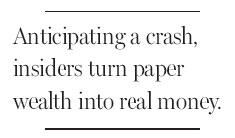Society
An urge to cash in, ahead of the bubble
Updated: 2011-06-26 07:37
By Miguel Helft (New York Times)

SAN FRANCISCO - While Silicon Valley and Wall Street debate whether a new technology bubble is in the making, some early Facebook employees are not taking any chances. They're leaving the company to cash out on millions of dollars in stock options while Facebook's valuation continues to soar.
"If you've seen the world blow up once, you just don't know what's going to happen a year from now," said one former Facebook employee, referring to the dot-com crash a decade ago.
He joined the company in its early days, and left a few months ago so he could sell some of his shares. A company policy bars current employees from selling stock. "It seemed very risky to stay in a situation where all of your liquidity was tied up in what I consider a high-risk company," he said, declining to make his name public.
He is hardly the only tech industry insider cashing in to minimize his financial risk in case the value of private companies starts heading down. Employees and investors at dozens of hot start-ups have sold hundreds of millions of dollars' worth of shares, fueling a booming market in private transactions.
Facebook has been driving the trend; last year, it accounted for nearly 45 percent of all the trades on SecondMarket, a leading marketplace for private company shares. Many of those trades came from Facebook's first 200 or so employees who joined before the fall of 2007 and own shares or stock options. According to several former employees, about 100 early employees have left the company, a figure Facebook declines to confirm.
And although they have left for many reasons - and Facebook insiders say that starting a new company is the most common one - guarding against a decline in share price has been a consideration for some.
"I was happy to sell 5 or 10 percent, so I could have a cushion in the worst-case scenario," said another former Facebook employee who left in recent months.
Perhaps no company has seen its early investors and founders take so much money off the table so quickly as Groupon. The company is still losing money, but some insiders have already become rich on it. Out of $946million that Groupon raised from investors last winter, $810million went into the pockets of the chief executive, Andrew Mason; the chairman, Eric Lefkofsky; and others. In April 2010, many of the same insiders pocketed an additional $120million. Founders and early investors have sold shares in start-ups for years, usually through brokers and a network of funds specializing in private-company transactions. But such sales have expanded greatly in recent years, with early rank-and-file employees participating in deals in ever-growing numbers.
Employees have become more interested in selling, in part because companies are taking longer to go public. And workers' eagerness to see tangible rewards has promoted the creation of a number of businesses to serve their needs. These include trading platforms like SecondMarket, specialized brokers like Felix Investments and even a new lender who will help employees turn their paper wealth into hard cash without having to sell their shares.
"In the last two years, a lot of employees in the Valley woke up to this market," said Hans Swildens, the founder and a managing partner at Industry Ventures, a decade-old company that has bought shares in companies like Facebook, Twitter, Chegg and eBags.
As Facebook's valuation has soared past $50 billion, making it by far the highest among Silicon Valley's crop of hot start-ups, many employees who own stock options and have been at the company since the early days after its founding seven years ago have been eager to profit.
Aware of that, Facebook has helped to broker sales for those employees twice - in 2009, when it allowed insiders to sell $100 million to Digital Sky Technologies, a Russian venture capital firm, and again this year, in a deal through T. Rowe Price, the investment firm. Employees were limited to selling up to 20 percent of their vested shares. For some, it wasn't enough.
"Even if I could sell all 20 percent, having 80 percent of your wealth in one illiquid asset is pretty insane," said one of the employees who left recently. "It's not enough to make yourself bulletproof if the world blows up." Some veterans of private company markets say they are not willing to say the tech industry is in a bubble yet, but they have started to worry.
"We are not sure that the valuations we are seeing are sustainable in the long term," said Kenneth B. Sawyer, the founder and managing director of Saints Capital, which has been active in secondary markets for more than a decade.
Mr. Sawyer says there are only a handful of companies that merit high valuations. "Just because a great company is valued highly doesn't mean there should be a halo effect on the others."
The New York Times

Specials

Premier Wen's European Visit
Premier Wen visits Hungary, Britain and Germany June 24-28.

My China story
Foreign readers are invited to share your China stories.

Singing up a revolution
Welshman makes a good living with songs that recall the fervor of China's New Beginning.